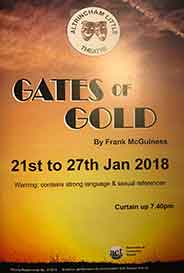Association of Community Theatre

GATES OF GOLD
by Frank McGuiness
Directed by Peter Nawn
Altrincham Little Theatre
 Not all dramatic presentations can satisfy every member of an audience. Whether it is the subject matter, or the language that is used within it, all can affect the public's opinion and maybe Gates of Gold falls into this catagory. However, it is important that the selection committee of a society or group continues to expose their clientele to a broad range of productions so that an audience can choose for themselves, and make choices on their individual likes and dislikes. One may even consider it an educational service that is provided, and not one to be shied away from.
Not all dramatic presentations can satisfy every member of an audience. Whether it is the subject matter, or the language that is used within it, all can affect the public's opinion and maybe Gates of Gold falls into this catagory. However, it is important that the selection committee of a society or group continues to expose their clientele to a broad range of productions so that an audience can choose for themselves, and make choices on their individual likes and dislikes. One may even consider it an educational service that is provided, and not one to be shied away from.
This play, by playwright Frank McGuiness, is loosely based around the true love story and relationship of actor Micheal MacLiammoir and director Hilton Edwards, who co-founded Dublin’s prestigious Gate Theatre in 1928.
The play centres around Gabriel (Stephen Moss) and his life partner, Conrad (Malcolm Cooper). Gabriel is dying and during his illness he reflects on his life experiences, both real and fictional, usually to Alma (Victoria Johnson), who is a nurse hired to care for him throughout his final days. Alma has her own problems and demons to contend with, in that she was involved in a car crash that killed her brother. Gabriel is visited by his sister Kassie (Kathryn Fennell) who is similar in outlook to her brother as she too talks of her life experiences, both real and fictional, but in a less eloquent manner. With her is her son Ryan (Steve Cunio), who, we learn, was at some point prior to Gabriel’s illness, seduced by Conrad, and though Gabriel wants to hate him he cannot in reality.
Stephen Moss gave a super performance as Gabriel. His body language and facial expressions gave the impression of a weary, tired man, and the gasps of breath established with the audience how ill the character was, and near the end of life. There was light and shade in his interactions with the other characters, often bringing out elements of humour as he reflects on life. At times his waspish comments, especially to Conrad, are meant to hurt.
Malcolm Cooper played Conrad as a patient man with a dry sense of humour that has put up with a lot of Gabriel’s histrionics in the past, and is used to them. Like many couples you got a sense that he is uncertain about facing the world alone without his partner.
I very much enjoyed watching these two actors explore the end of a lasting and loving partnership. At times the love was tangible, none more so than in the final scene as they both lie on the bed and cuddle as Gabriel’s life ebbs away. There was a real tenderness here from two people who are comfortable with each other.
Victoria Johnson’s portrayal of Alma was feisty, no nonsense yet caring and astute and well played. It was a surprise to witness how tortured her character was about the death of her brother.
As with all theatre the backstage elements make a production a success and here I was impressed with the set designed by Polina Sparks and Alan Reidsma. The raised, curved bedroom was aesthetically very pleasing to look at and was furnished well. To have the sitting room at the side but without a dividing wall in evidence meant that the flow of dialogue between scenes was fluid.
In contrast the closure of the curtain at the end of each scene felt a little long and while I know these were to change some props, or to allow a costume change, it did stop the flow of the piece. I watched on opening night so feel certain these would have become quicker as the week went on.
The lighting plot by Steve Smith and Ian Stenhouse was superb and really added to the drama of the play. The lighting established for the audience what time of day every scene was taking place. The waning light in the final scene between Gabriel and Conrad was very poignant as it symbolised the ebbing away of Gabriel’s life perfectly and established the pathos at the end.